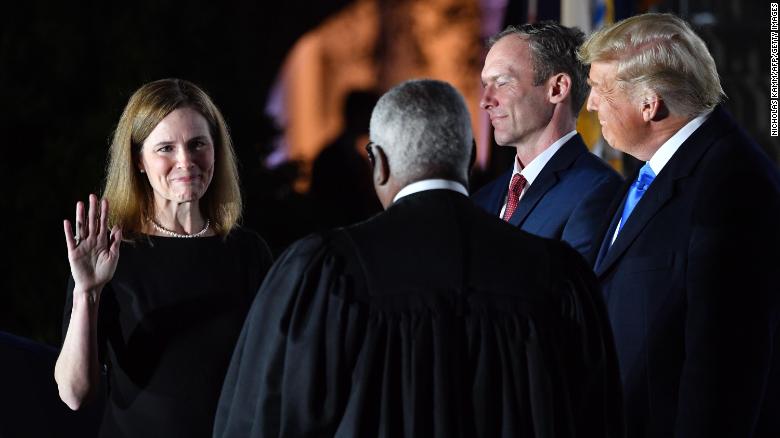Supreme Court confirmation leaves students and faculty wondering about the future social, economic issues

As if the upcoming election wasn’t haywire enough, the recent confirmation of Amy Coney Barrett to the Supreme Court on Monday night has left many students concerned about the future of civil rights for marginalized groups.
Between Barrett’s confirmation being so close to Election Day and her conservative Christian values worrying those who hold more liberal beliefs, there’s been a mixed response of acceptance and fear surrounding her new place on the court, and USF students aren’t exempt from this.
Appointing a justice is not an everyday occurrence. With their lifelong terms and a panel of only nine, whenever a seat opens up there is an uproar. Many see the ratio between left- or right-leaning justices as an important factor in determining the outcomes of cases that affect prominent issues such as abortion, health care, LGBTQ rights and racism.
Many also believe she will be a residual, long-lasting stamp of the Trump administration.
“Her confirmation will only continue to divide the people in this nation further,” said chemistry student Syed Hasan. “More divisive than we already are.”
There are some who don’t share Hasan’s view, and consider Barrett a positive addition to the court.
“Justices aren’t meant to be appointed based on personal opinion but on morality and quality of character,” said freshman chemistry student Daniel Hunte. “As far as that goes, I don’t think there’s any reason not to appoint [her], she’s an excellent person.”
But the news on Barrett’s confirmation seems to hit some harder than others.
“When I first saw the headline, I felt the same way I did when Trump got elected in 2016,” said freshman chemistry student Kylie Parker. “Of course I’m scared and disappointed, but I also feel numb because nothing ‘bad’ has technically happened yet.”
Parker, a member of the LGBTQ community and reliant on the Affordable Care Act (ACA) for health insurance, said the confirmation has made her feel helpless about the future.
Many students rely on the ACA for health insurance, as it allows them to stay on their parents’ insurance until they’re 26 years old instead of releasing them from it at 18.
“[I’m] stressed about whether or not I’ll still have insurance in a few months,” said senior English student Nicole Coppage.
The Supreme Court is expected to make two votes regarding the ACA within the year. One determines whether or not the ACA’s individual mandate for a minimum amount of health insurance coverage is constitutional or not, and if it isn’t, the ACA could be done away with entirely, according to the American Bar Association.
“The ACA contains dozens and dozens of features beyond the health benefit component,” said Senior Associate Dean of Morsani College of Medicine and Associate Vice President of USF Health Jay Wolfson. “That includes training components for nurses, physicians and physician’s assistants, they include labeling products for caloric value, they include significant aspects of fraud reduction and abuse control.”
Discussion on whether or not the ACA will stand in the next year also has USF students concerned about the possibility of retroactive decisions made regarding other famous Supreme Court cases like Obergefell v. Hodges, which legalized gay marriage nationwide in 2012.
“As a bisexual man who just recently got the right to marry in 2012, it feels like a huge slap in the face to watch as Republicans push forward a judge onto the seat to further their political agenda, one such priority being to reverse the legalization of gay marriage as stated on Page 31 of their GOP political platform PDF,” said freshman mass communications major Christian Padgett.
The Republican Party’s official 2016 platform, the party which Barrett is affiliated with, takes the stance that marriage should be recognized by law as “the union of one man and one woman.”
A lot of the concern over Barrett’s presence on the court is due to her personal beliefs, which people have concluded are conservative through the history of her career decisions. This includes issues of systemic racism in the U.S.
“Since the end of the [Chief Justice Earl] Warren court, the Supreme Court has become less and less amenable to understanding racial discrimination as a structural problem as opposed to an individual one,” said David Ponton III, assistant professor at the USF School of Interdisciplinary Global Studies. “Plaintiffs have since had to prove that racism and racist effects are intentional and identify a specific actor as responsible.
“Amy Coney Barrett went even further in her employment discrimination cases, saying that the use of the n-word by an employer to an employee is not enough evidence to win a suit of workplace discrimination. Since she is clearly not an anti-racist, I can only conclude that the Senate has added another racist to the Supreme Court.”
Despite a substantial amount of disapproval by some, there are those who stand by the faith in the judiciary as a system intended to operate by the law alone, separate from personal beliefs.
“I understand people’s worries about her conservative views, however, the articles I have read [have] shown she goes by the Constitution, which is a good thing,” said junior chemical engineering major Mason Perlman.
Barrett’s confirmation isn’t decidedly about winning a conservative majority in the Supreme Court. It’s more about re-election tactics according to J. Edwin Benton, professor at the College of Arts and Sciences who specializes in elections and the influence of courts.
“What happened is purely political for Trump, [South Carolina Sen. Lindsey] Graham, who needs more support in the ballot box, [Senate Majority Leader] Mitch McConnell and even other Republicans who have hitched their wagon, if I can say it that way, to the fortress of Donald Trump,” said Benton.
The timeliness of Barrett’s confirmation has also been a point of contention for those who disapprove of her new position, considering the arguments that ensued among politicians in 2016 when former President Barack Obama was at the end of his term and able to fill a vacant seat.
“The reason why the Democrats are crying foul is because [they’re saying] ‘OK, you do have the right to do that, but what did you do five years ago when President Obama wanted to appoint Judge [Merrick] Garland?’” said Benton. “The Republicans created a roadblock, wouldn’t let it happen, because they wanted that appointment to go to what eventually fell to Judge [Brett] Kavanaugh, a Trump appointee.
“The Republicans played dirty, said we can do this, but you can’t do this, and you can’t block the nomination. The Democrats would’ve had no ground to say that if they had allowed Obama to make his appointment, assuming [they] would have been on the [Supreme] Court today.”
The lines seem blurred, but no matter how close Election Day is, a vacant seat on the Supreme Court can still be filled, according to Wolfson.
“The reality is that the president of the United States has the prerogative and authority to nominate a vacant seat, and the Senate of the U.S. has the prerogative and requirement to review and make the decision of an appointment,” said Wolfson. “So the process as it was is completely and entirely within the guidelines of the Constitution.”
Concerns and debates over what Barrett’s new presence on the court will do remain, regardless of the legality of her confirmation. On a local and national level, people question how her position will impact the future of federal judiciary decisions.
“If you listen to the hearings, all of the ‘hoopla’ was around what they perceive that Barrett would do if she were on the court, [including] some very important cases to liberals,” said Benton.






